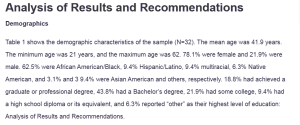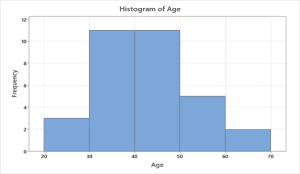Analysis of Results and Recommendations
Demographics
Table 1 shows the demographic characteristics of the sample (N=32). The mean age was 41.9 years. The minimum age was 21 years, and the maximum age was 62. 78.1% were female and 21.9% were male. 62.5% were African American/Black, 9.4% Hispanic/Latino, 9.4% multiracial, 6.3% Native American, and 3.1% and 3 9.4% were Asian American and others, respectively. 18.8% had achieved a graduate or professional degree, 43.8% had a Bachelor’s degree, 21.9% had some college, 9.4% had a high school diploma or its equivalent, and 6.3% reported “other” as their highest level of education: Analysis of Results and Recommendations.
Table 1
Demographics
| Gender | N=32 | |
| Female | 25 (78.1%) | |
| Male | 7 (21.9%) | |
| Race | ||
| African American/Black | 20 (62.5%) | |
| Hispanic/Latino | 3 (9.4%) | |
| Multiracial | 3 (9.4%) | |
| Native American | 2 (6.3%) | |
| Asian American | 1 (3.1%) | |
| Other | 3 (9.4%) | |
| Highest Level of Education | ||
| Graduate or professional degree | 6 (18.8%) | |
| Bachelor’s degree | 14 (43.8%) | |
| Some college | 7 (21.9%) | |
| High school diploma or equivalent | 3 (9.4%) | |
| Other | 2 (6.3%) | |
Figure 1
Histogram of Participants’ Age
Gender, Mental Health Stigma, and Mental Health Seeking Behaviors
Table 1 shows the overall views on mental health and attitudes toward mental health help-seeking on the basis of gender. Six out of 25 women (24.0%) agreed with the take that having or showing mental health issues is a sign of personal weakness. 40% of women, compared to 71.4% of men, agreed with taking mental issues as serious within the community. 62.5% of women and 71.4% of men agreed with the take that people in their community did not view mental health issues as serious conditions as they view physical health conditions.
Eleven women (out of 25) and only two men (out of seven) agreed with the influence of community views related to mental health issues on their willingness to seek professional mental health help. Additionally, six women and one man felt they would be discriminated against for seeking mental health help, which influenced their mental health-seeking behaviors. The participants also agreed with the statement that their cultural or family beliefs discourage seeking mental health help.
Table 2
Gender, Mental Health Stigma, and Mental Health Seeking Behaviors
| Number (%) who responded Agree or agree strongly | ||||
| Overall | Female
(n = 25) |
Male
(n = 7) |
||
| Mental Health Stigma | ||||
| S1. Having or showing mental health issues is a sign of personal weakness. | 6 (18.8%) | 6 (24.0%) | 0 (0.0%) | |
| S2. Mental health issues are taken seriously in my community. | 15 (46.9%) | 10 (40.0%) | 5 (71.4%) | |
| S3. People in my community talk negatively about people with mental health issues. | 20 (62.5%) | 15 (60.0%) | 5 (71.4%) | |
| S4. People in my community do not view mental health issues as serious conditions as they view physical health conditions. | 20 (62.5%) | 15 (60.0%) | 5 (71.4%) | |
| Mental Health Seeking Behaviors | ||||
| S5. I would like to seek professional help on mental health, but I am concerned about what my people would think of me. | 7 (21.9%) | 6 (24.0%) | 1 (14.3%) | |
| S6. The views in my community related to mental health issues influence my willingness to seek professional mental health help. | 13 (40.6%) | 11 (44.0%) | 2 (28.6%) | |
| S7. My cultural or family beliefs discourage seeking mental health help. | 7 (21.9%) | 6 (24.0%) | 1 (14.3%) | |
| S8. You would be discriminated against for seeking mental health help in my community. | 7 (21.9%) | 6 (24.0%) | 1 (14.3%) | |
Race, Mental Health Stigma, and Mental Health Seeking Behaviors
Table 3 and Table 4 show the socio-demographic correlates of mental health stigma and mental health-seeking behaviors. Blacks had the highest level of agreeance with the statements, with over 50% responding as strongly agree with all statements testing on mental health stigma and mental health-seeking behaviors. 55% of Blacks strongly agreed that “People in my community do not view mental health issues as serious conditions as they view physical health conditions.”
The level of education had mixed levels of agreeance with the statements on both mental health stigma and mental health-seeking behaviors. People with lower levels of education had lower scores in levels of agreeance to “Mental health issues are taken seriously in my community” but higher levels of agreeance to “People in my community talk negatively about people with mental health issues” and “The views in my community related to mental health issues influence my willingness to seek professional mental health help.”
Table 3
Race, Mental Health Stigma, and Mental Health Seeking Behaviors
| Number (%) who responded Agree or agree strongly | ||||
| Overall | Black
(n = 20) |
Other
(n = 12) |
||
| Mental Health Stigma | ||||
| 1. Having or showing mental health issues is a sign of personal weakness. | 6 (18.8%) | 6 (30.0%) | 0 (0.0%) | |
| 2. Mental health issues are taken seriously in my community. | 15 (46.9%) | 10 (50.0%) | 5 (41.7%) | |
| 3. People in my community talk negatively about people with mental health issues. | 20 (62.5%) | 10 (50.0%) | 10 (83.3%) | |
| 4. People in my community do not view mental health issues as serious conditions as they view physical health conditions. | 20 (62.5%) | 11 (55.0%) | 9 (75.0%) | |
| Mental Health Seeking Behaviors | ||||
| 5. I would like to seek professional help on mental health, but I am concerned about what my people would think of me. | 7 (21.9%) | 3 (15.0%) | 4 (33.3%) | |
| 6. The views in my community related to mental health issues influence my willingness to seek professional mental health help. | 13 (40.6%) | 6 (30.0%) | 7 (58.3%) | |
| 7. My cultural or family beliefs discourage seeking mental health help. | 7 (21.9%) | 4 (20.0%) | 3 (25.0%) | |
| 8. You would be discriminated against for seeking mental health help in my community. | 7 (21.9%) | 3 (15.0%) | 4 (33.3%) | |
Table 4
Level of Education, Mental Health Stigma, and Mental Health Seeking Behaviors
| Number (%) who responded “Agree” or “Agree Strongly” | |||||
| Overall | Graduate or professional degree
(n = 6) |
Bachelor’s degree
(n = 14) |
Other
(n = 12) |
||
| Mental Health Stigma | |||||
| 1. Having or showing mental health issues is a sign of personal weakness. | 6 (18.8%) | 1 (16.7%) | 2 (14.3%) | 3 (25.0%) | |
| 2. Mental health issues are taken seriously in my community. | 15 (46.9%) | 2 (33.3%) | 7 (50.0%) | 6 (50.0%) | |
| 3. People in my community talk negatively about people with mental health issues. | 20 (62.5%) | 4 (66.7%) | 9 (64.3%) | 7 (58.3%) | |
| 4. People in my community do not view mental health issues as serious conditions as they view physical health conditions. | 20 (62.5%) | 6 (100.0%) | 10 (71.4%) | 4 (33.3%) | |
| Mental Health Seeking Behaviors | |||||
| 5. I would like to seek professional help on mental health, but I am concerned about what my people would think of me. | 7 (21.9%) | 1 (16.7%) | 5 (35.7%) | 1 (8.3%) | |
| 6. The views in my community related to mental health issues influence my willingness to seek professional mental health help. | 13 (40.6%) | 2 (33.3%) | 6 (42.9%) | 5 (41.7%) | |
| 7. My cultural or family beliefs discourage seeking mental health help. | 7 (21.9%) | 4 (66.7%) | 1 (7.1%) | 2 (16.7%) | |
| 8. You would be discriminated against for seeking mental health help in my community. | 7 (21.9%) | 2 (33.3%) | 4 (28.6%) | 1 (8.3%) | |
Discussion
This research study explored how mental health stigma influences mental health-seeking behaviors among racial or ethnic minorities. It was evident that men, compared to women, were more likely to promote mental health stigmatization and have poor mental health-seeking behaviors. Men have been noted to be poor in identifying mental health issues compared to women (Otten et al., 2021), with gender noted as an influencing factor in the use of mental health services (Sagar-Ouriaghli et al., 2019).
Black people held the highest levels of negativity toward mental health issues, with such views influencing their willingness to seek mental health help. Past research has noted Blacks/African Americans have the highest levels of mental health stigmatization (Pederson et al., 2022), with such stigma acting as a barrier to help-seeking among the community (Planey et al., 2019).
Strengths and Limitations of the Study
The main strengths of the study include the use of an interprofessional collaborative approach. However, this project had limited access to community-specific data. Also, some participants exhibited unwillingness to respond due to experienced and internalized stigma.
Recommendations
Future studies need to utilize a larger sample with a focus on collecting community-specific data to explore specific mental health stigma factors and their specific influence on mental health help-seeking behaviors. The findings have various implications for practice and research, including guiding the design of interdisciplinary, culturally sensitive collaborative care teams for mental healthcare in multicultural settings. It sets a precedent for research focusing on the design of community and group-targeted mental health care.
References
Otten, D., Tibubos, A. N., Schomerus, G., Brähler, E., Binder, H., Kruse, J., Ladwig, K. H., Wild, P. S., Grabe, H. J., & Beutel, M. E. (2021). Similarities and differences of mental health in women and men: A systematic review of findings in three large German cohorts. Frontiers in Public Health, 9, 553071. https://doi.org/10.3389/FPUBH.2021.553071/BIBTEX
Pederson, A. B., Hawkins, D., & Conteh, N. (2022). Ethnic identity and mental health stigma among Black adults in the United States. Ethics, Medicine and Public Health, 25, 100774. https://doi.org/10.1016/J.JEMEP.2022.100774
Planey, A. M., Smith, S. M. N., Moore, S., & Walker, T. D. (2019). Barriers and facilitators to mental health help-seeking among African American youth and their families: A systematic review study. Children and Youth Services Review, 101, 190–200. https://doi.org/10.1016/J.CHILDYOUTH.2019.04.001
Sagar-Ouriaghli, I., Godfrey, E., Bridge, L., Meade, L., & Brown, J. S. L. (2019). Improving mental health service utilization among men: A systematic review and synthesis of behavior change techniques within interventions targeting help-seeking. American Journal of Men’s Health, 13(3), 1557988319857009. https://doi.org/10.1177/1557988319857009
ORDER A PLAGIARISM-FREE PAPER HERE
We’ll write everything from scratch
Question
Results Assignment: Analysis and Recommendations (two pages) 25% Due Week 4 Summarize your results in a word document. Use tables if appropriate. Discuss limitations to your project; discuss recommendations because of your project. Provide additional literature to support your discussion.

Analysis of Results and Recommendations
- Hello, I uploaded my report,


